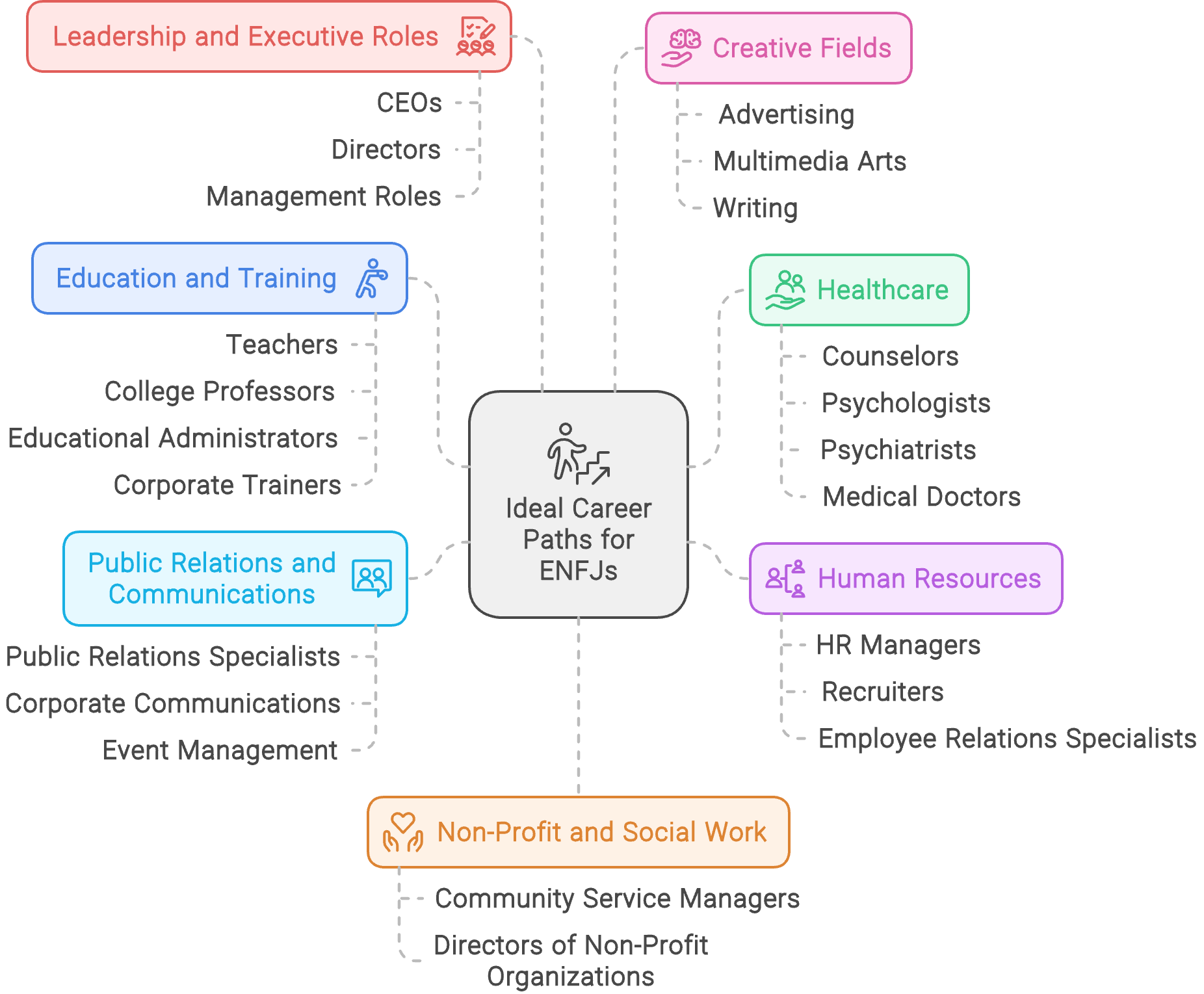

In the landscape of talent acquisition, understanding personality types is more than a mere trend—it's a strategic approach to hiring the right talent. The ENFJ personality type, often dubbed the 'Protagonist' or 'Giver,' constitutes approximately 2-3% of the population. This rarity makes ENFJ candidates a unique addition to any team, known for their charismatic, inspiring, and altruistic nature. In this blog post, we delve into the world of ENFJ candidates—exploring their key strengths, potential limitations, and the environments in which they thrive. Our insights are tailored to help talent acquisition professionals not only identify ENFJ candidates but also to understand what makes them tick and how to effectively integrate them into your teams. Additionally, we will discuss how Adaface's tailored assessments can streamline the process of discovering and engaging these exceptional individuals.
ENFJ Candidates: Key Strengths, Limitations, and Personality Traits
ENFJs make up just 2.5% of the population, yet they are often drawn to leadership roles and careers in education, social work, and counseling. Known as "Protagonists", ENFJs are charismatic, idealistic, and deeply caring. They have a strong drive to help others and make a positive impact on the world around them.In the workplace, ENFJs excel at collaboration, communication, and bringing out the best in their colleagues. They are skilled at building relationships, reading emotions, and persuading others. ENFJs are ambitious on behalf of their team rather than themselves, and find great fulfillment in contributing to the growth and development of others.However, ENFJs' desire to be liked can make conflict difficult for them. They may struggle with setting boundaries and saying no, leading to burnout if not careful. ENFJs' tendency to focus on the big picture can also cause them to overlook important details or facts when making decisions.

Strengths:
- Empathy: ENFJs are exceptional at understanding others' feelings and motivations, making them natural leaders in collaborative settings.
- Communication Skills: They excel in verbal and non-verbal communication, often acting as mediators and motivators.
- Organizational Abilities: With a penchant for planning and coordination, ENFJs can manage projects and people effectively, ensuring that team goals are met on time.
Limitations:
- Overidealism: Sometimes, their idealistic visions can clash with reality, leading to disappointment or frustration.
- Sensitivity to Criticism: Their strong desire to be liked and their sensitivity can make them react poorly to criticism, which may affect their decision-making.
Personality Traits:
- Charismatic, warm, and approachable, they often take on mentorship roles within a team.
- Strong values and principles guide their actions, making them advocates for corporate ethics and social responsibility.
| Trait | Strength | Weakness |
|---|---|---|
| Charismatic | Inspires and motivates others with enthusiasm and positive energy. | Can be overly concerned with how they are perceived by others, leading to stress. |
| Empathetic | Easily understands and responds to the emotions and needs of others. | May prioritize others' needs over their own, leading to burnout. |
| Visionary | Thinks strategically and helps shape the future direction of a team or organization. | Can become frustrated when ideas are not immediately realized or accepted. |
| Diplomatic | Skilled at resolving conflicts and fostering a harmonious team environment. | May avoid necessary confrontations to maintain peace, leading to unresolved issues. |
| Organized | Ensures that plans and projects are well-coordinated and executed efficiently. | Can become stressed when plans do not go as expected or when faced with uncertainty. |
| Supportive | Encourages and uplifts others, often serving as a mentor or coach. | May struggle to set boundaries, leading to overcommitment and exhaustion. |
What Giver applicants look for in a workplace
ENFJs are drawn to roles and organizations that align with their values and allow them to make a meaningful difference. They thrive in collaborative, people-oriented environments that foster creativity and personal growth. ENFJs want to work with others who share their passion for making a positive impact.Stability and clear expectations are important to ENFJs, who prefer structured roles with defined responsibilities. They appreciate managers who provide support, encouragement, and opportunities for development. ENFJs are motivated by the chance to take on new challenges and make a visible contribution to the team's success.
ENFJ Careers: Ideal Paths for the Protagonist Personality
ENFJs, with their charismatic, empathetic, and leadership-driven personalities, thrive in careers that allow them to influence, teach, and help others grow. Known as 'Protagonists,' ENFJs are well-suited to roles that require excellent interpersonal skills, the ability to manage and inspire teams, and opportunities to drive positive change. Here are some ideal career paths for ENFJ personality types:
1. Education and Training: ENFJs excel in educational settings where they can mentor and inspire learners. Roles such as teachers, college professors, educational administrators, or corporate trainers align well with their passion for developing others' potential and guiding them to success.
2. Healthcare: The caring and altruistic nature of ENFJs makes them suitable for the healthcare sector, particularly in roles where patient interaction is key. Positions like counselor, psychologist, psychiatrist, or even medical doctor can be fulfilling as they allow ENFJs to directly impact individuals' well-being.
3. Human Resources: Human resources provide a perfect platform for ENFJs to utilize their strong interpersonal and organizational skills. Roles such as HR manager, recruiter, or employee relations specialist allow them to develop and implement policies that improve workplace culture and employee satisfaction.
4. Public Relations and Communications: ENFJs are natural communicators, making them ideal for roles in public relations, corporate communications, or event management. These careers require a knack for persuasion and the ability to craft messages that resonate with diverse audiences, both of which are strengths of ENFJs.
5. Non-Profit and Social Work: Given their drive to make a significant impact, ENFJs may find fulfilling careers in non-profit organizations or social work. Positions that allow them to lead and manage social change initiatives, such as community service managers or directors of non-profit organizations, can be particularly rewarding.
6. Leadership and Executive Roles: ENFJs are visionary leaders who can inspire their teams to achieve collective goals. Executive positions such as CEO, director, or other management roles in any field can suit their ability to strategize and mobilize people effectively.
7. Creative Fields: ENFJs' intuitive nature combined with their people skills can also make them successful in creative fields such as advertising, multimedia arts, or writing, especially in roles that require collaborative project management and a deep understanding of human emotions and motivations.

How to assess a Giver-type candidate
When interviewing an ENFJ candidate, focus on their communication and interpersonal skills. Ask about their experience building relationships, motivating others, and resolving conflicts. Assess their ability to think strategically while also considering the human element.
Behavioral questions that explore the candidate's values, goals, and decision-making process can provide valuable insights. For example: "Tell me about a time you had to make a difficult choice that impacted others. How did you approach that situation?"Look for evidence of the ENFJ's idealism, empathy, and commitment to making a difference. Assess their leadership potential by asking about their experience mentoring, training, or coaching others. Gauge their ability to adapt to change and handle ambiguity.
Strategies for Retaining ENFJ Talent
Retaining ENFJ employees involves understanding and catering to their intrinsic motivations and values. ENFJs are driven by a desire to connect with others and contribute positively to their community and workplace. Here are some targeted strategies to ensure ENFJs not only remain engaged but also thrive within your organization.
1. Meaningful Work and Impact: ENFJs need to feel that their work is meaningful and makes a difference. Organizations can retain ENFJ talent by aligning their roles with opportunities to impact the company and community positively. Initiatives that allow ENFJs to lead outreach programs, corporate social responsibility activities, or internal mentorship programs can be particularly effective.
2. Opportunities for Growth and Development: ENFJs are lifelong learners who seek continuous personal and professional growth. Offering regular training sessions, workshops, and courses that help them develop new skills and advance their careers can significantly increase their job satisfaction and loyalty. Additionally, providing clear career paths and leadership opportunities that align with their aspirations is crucial.
3. Recognition and Appreciation: ENFJs thrive in environments where their efforts are recognized and appreciated. Regular, genuine appreciation from peers and supervisors can motivate them immensely. Implementing a recognition program that highlights their achievements and contributions to the team can help reinforce their value to the organization.
4. Supportive Leadership: Leadership that is supportive and considerate of ENFJ values and aspirations can greatly enhance their job satisfaction. Leaders should strive to understand individual ENFJ employees’ motivations and provide the support needed to help them succeed. This includes regular one-on-one meetings where feedback is both given and received, ensuring an open line of communication.
5. Collaborative Work Environment: A collaborative and team-oriented work environment is essential for ENFJs, who are naturally inclined to seek harmonious relationships. Creating a culture that promotes teamwork and communication allows ENFJs to excel, as they can lead by bringing people together and fostering a sense of community within the team.
6. Flexibility and Work-Life Balance: ENFJs value balance in their lives and appreciate when an organization supports this. Flexibility in work hours and the possibility of remote work can help ENFJs manage their often busy schedules more effectively, leading to greater job satisfaction and reduced burnout.
7. Ethical Standards and Integrity: Finally, upholding high ethical standards and integrity within the workplace resonates strongly with ENFJs. They are more likely to stay with an organization that reflects their own values and conducts business in a fair and ethical manner.
How Adaface can help with Giver talent acquisition
Adaface's skills assessments help identify ENFJ candidates with the right combination of technical abilities and soft skills to thrive in your organization. Our tests evaluate communication, collaboration, problem-solving, and critical thinking - key strengths of the ENFJ personality type.
Adaface's assessments are designed to be engaging and relevant, providing an authentic preview of the role. By focusing on skills rather than credentials, we help you uncover hidden gems and make more informed hiring decisions. Our platform is customizable to your unique needs, allowing you to assess the specific competencies required for success in your organization.
FAQs
How can employers attract ENFJ candidates?
To attract ENFJ candidates, employers should highlight roles that involve teamwork, leadership, and community impact. Showcasing a company culture that values ethics, personal growth, and positive societal impact can also appeal to ENFJs.
What are effective interview questions for ENFJ candidates?
Effective questions for ENFJ candidates might include: "Can you describe a time when you led a team through a challenging project?" or "How do you handle conflicts within a team?" These questions help reveal their leadership and conflict resolution skills.
What are common challenges when managing ENFJ employees?
Common challenges include their sensitivity to criticism and their idealism, which might lead to disappointment. Managers can address these issues by providing constructive feedback in a supportive manner and setting realistic expectations for projects.
How do ENFJ candidates enhance workplace culture?
ENFJ candidates enhance workplace culture by promoting harmony, encouraging open communication, and fostering a supportive environment. Their natural leadership helps in mentoring roles and drives team initiatives forward.
What should employers consider when developing career paths for ENFJ employees?
Employers should provide ENFJ employees with opportunities that align with their values, such as roles involving corporate social responsibility or community engagement. Career paths that allow for growth in leadership roles and personal development will be particularly appealing to them.

Spending too much time screening candidates?
We make it easy for you to find the best candidates in your pipeline-
with a 40 min skills test.


